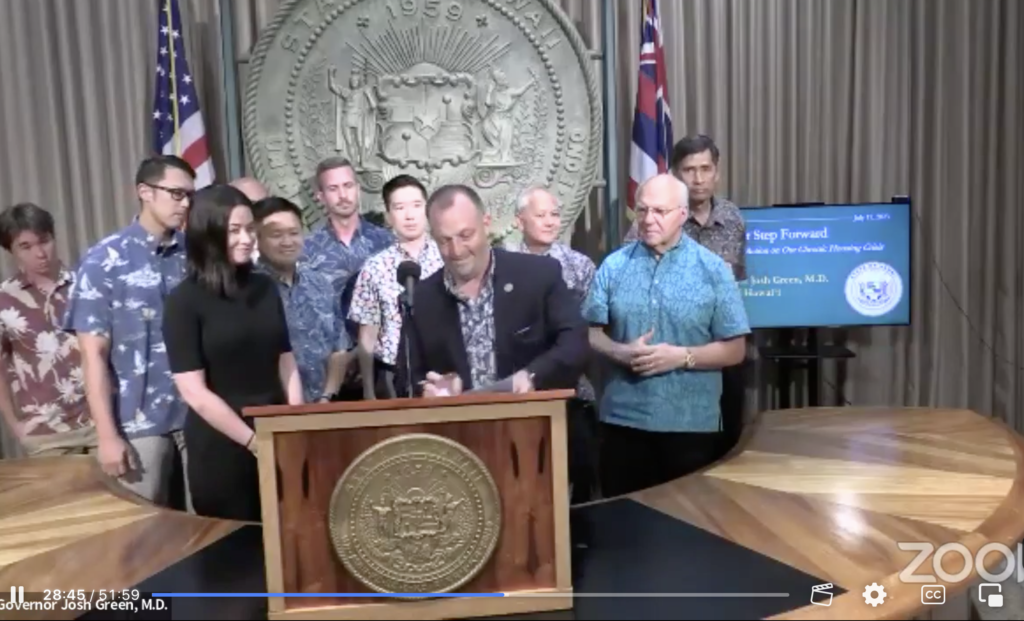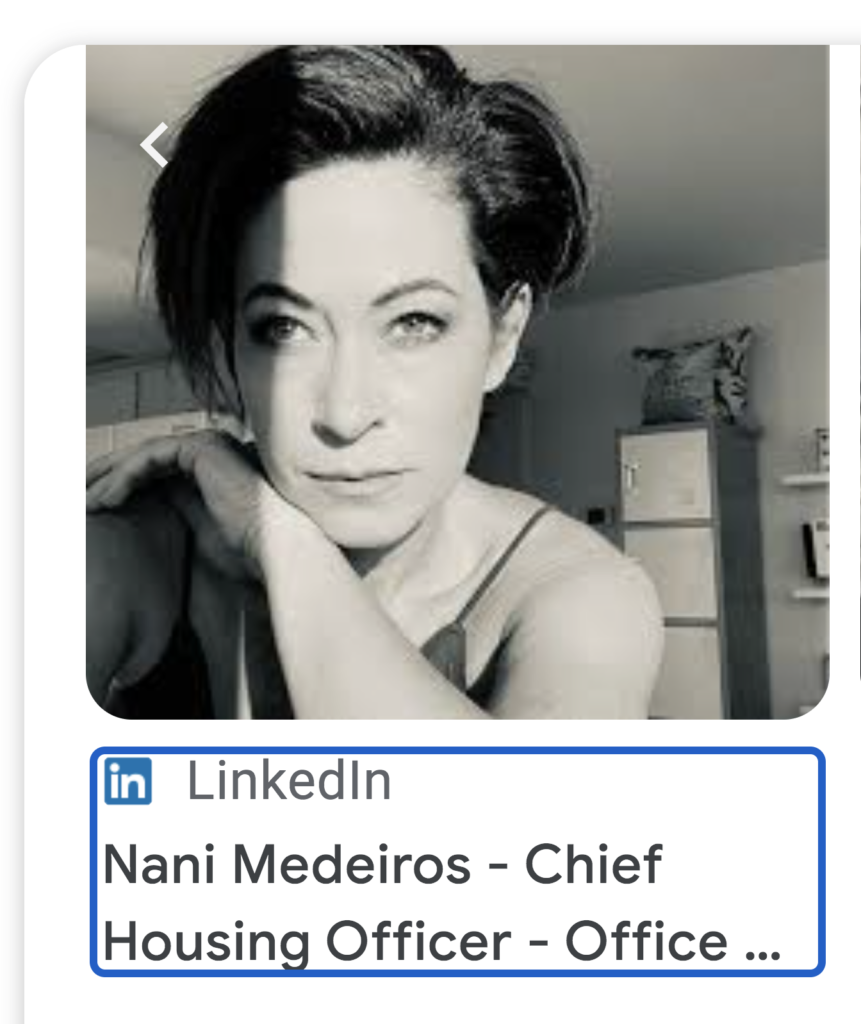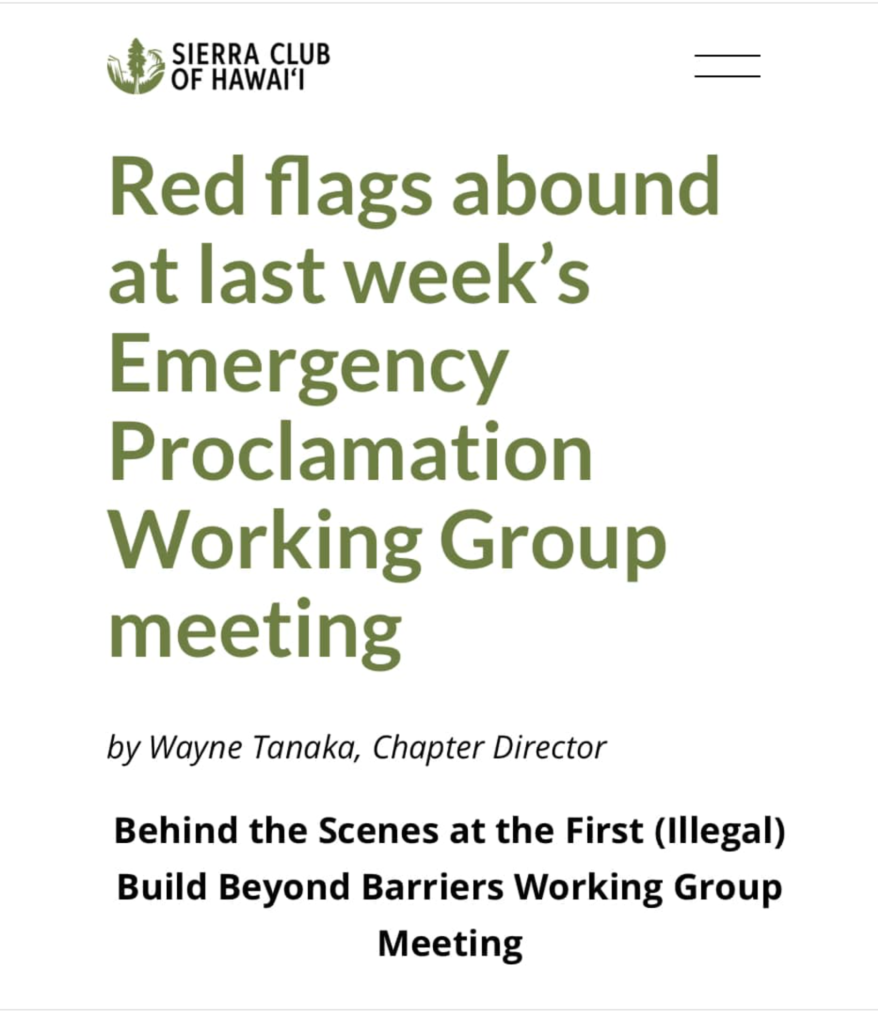Governor Josh Green’s “Emergency Proclamation” (EP) for “Affordable Housing” is getting more alarming.
Basic protections like the Sunshine Law and Public Participation are suspended in the name of “affordable housing crisis”, to expedite development processes and alleviate the state’s acute shortage of housing units. The EP is good for twelve months. Then what?
Here is the fine print of the Emergency Proclamation.


Here is a copy of Hawaii Sierra Club Director Wayne Chung Tanaka’s observations of the first “Build Beyond Barriers” meeting at the Hawaii State Capitol in August 2023.

” Takeaways:
The “Build Beyond Barriers Working Group” Chair, Nani Medeiros, unilaterally suspended ALL PROVISIONS of the Sunshine Law, despite having no justification to do so. Meeting facilitator Scott Glenn and developer consultant Trisha Watson actively sought to suppress any discussion about the illegal, non-transparent nature of the Working Group’s first meeting.
Earthjustice attorney David Henkin was ejected from physically observing the meeting even after being told he could attend as a member of the public, and had the sheriffs called on him by the Governor’s deputy general counsel Jeremy Lakin.
Because there was only one microphone for a room of 30-plus participants, the Facebook livestream of the meeting was largely inaudible.
Nani Medeiros confirmed that she, as the “Lead Housing Officer,” had authority to approve any project that received any state or county waiver or exemption, or that used any state or county financing, funds, or lands. Such projects would be eligible to proceed without complying with the laws suspended by the proclamation – and without any Working Group approval, review, or notification.
“In a democracy, the people are vested with the ultimate decision-making power. Governmental agencies exist to aid the people in the formation and conduct of public policy. Opening up the governmental processes to public scrutiny and participation is the only viable and reasonable method of protecting the public’s interest.” – HRS Chapter 92 (a.k.a. the “Sunshine Law”)
The first “Build Beyond Barriers Working Group” meeting was held on Friday, and the situation with the Governor’s emergency housing proclamation is far, far worse than I had thought. While there was scarcely time for questions during a meeting largely taken up by performative introductions, Working Group leadership made clear that they had no regard for transparency or the law – even as described in the proclamation itself. Previously, I had written my concerns to Working Group chair Nani Medeiros, regarding the apparent suspension of the Sunshine Law. I had observed that the meeting had not been posted to the state calendar with the required six days’ notice.
Nani confirmed that she had decided to unilaterally suspend the notice requirement of the Sunshine Law. Her excuse pointed to logistical issues that needed to be resolved first – namely, coordinating flights for neighbor island working group members and members of the island burial councils (only one burial council member, from Molokaʻi, would end up attending – via Zoom), and finding table microphones so that “sound distribution is strong for participants and observers.”
Nani wrote that she was “committed to making these meetings accessible to the public, even if it means personally investing in equipment” (emphasis added), and promised that the meeting would be posted on the state calendar once all the details were set.
The meeting was never posted on the state calendar, and the information sent to news media for the public to observe the meeting online had the wrong time. When Working Group members arrived at the Governor’s conference room Friday morning, there was only one microphone, tethered to a conference phone by a cord not much longer than six feet, to be shared by some thirty-odd people.
Needless to say, the meeting was largely inaudible to the Facebook Live viewers who were able to find the correct link.Before the Working Group meeting began, a member of the public who wished to quietly observe in person – environmental attorney David Henkin, no less – was ejected by the Governor’s deputy general counsel, Jeremy Lakin. Jeremy even went so far as to call the state sheriffs, rather than contemplate the legality of his action.
Apparently, the public observation provisions of the Sunshine Law had also been suspended for this meeting, in addition to its public notice requirements. Public input requirements were obviously also suspended.
I immediately attempted to ask for clarity about what provisions of the Sunshine Law had been suspended, since the emergency proclamation itself only allows for the suspension of provisions of the Sunshine Law to the extent needed for “expeditious action, decision, or approval.” Posting notice on the state calendar, and allowing a member of the public to quietly observe in person – both requirements of the Sunshine Law – would not delay any conceivable actions, decisionmaking, or approvals.
(In fact, it turned out there also was no action, decisionmaking, or approval whatsoever during the meeting that would justify any Sunshine Law suspension under the proclamation, despite Nani’s prior written (and false) statement that there would be “important decision-making processes taking place.”)
Unfortunately, vice chair Scott Glenn clearly did not want me to raise these concerns, and asked that I hold my question until the end of the meeting.
During our “introductions,” I again warned the group that violating the Sunshine Law was a Big Deal and an invitation for lawsuits, and was met with blank stares. Scott said there would be time to address my concerns after introductions were complete.
Eventually, during the few minutes we had for questions, I was told that the Sunshine Law had been suspended in its entirety. When I questioned how that could be, given the language of the proclamation, developer consultant and Working Group member Trisha Watson cut me off. She said my concerns about legal compliance should be tabled, and that she had “real questions.” No one objected.
The Working Group leadership’s flippant disregard of both the law and the critical importance of public transparency was simply astounding. These are the people we, the public, are being asked to trust with the future of our islands.
In response to the only other question I was allowed to raise, Nani also confirmed that she, the lead housing officer, had unilateral authority to bypass the Working Group completely, and approve any project that received any state or county exemption or waiver, or used any state or county lands, funds, or financing. She also made clear she was under no obligation to even inform the Working Group of any such approvals.
Yes, this is real life. And incredibly, the Working Group Chair’s willingness to disregard the law, eschew transparency, and repeatedly lie – in writing, no less – makes clear that this emergency proclamation and the people in charge of it are even more dangerous than I had previously worried.
Friends, the future of our islands – our cherished landscapes, our cultural foundations, our social fabric, and even our housing crisis itself – may be harmed irrevocably by a proclamation that puts unprecedented power in the hands of a few individuals. These individuals have already shown that they will not – or cannot – even coordinate a single introductory meeting in compliance with the proclamation itself. We are now being asked to let these same people administer and enforce an initiative involving tens of thousands of un-affordable housing units across hundreds or potentially thousands of acres of land, throughout the islands.
Even with the best intentions, developers will surely run circles around this Working Group’s leadership, to the benefit of corporate profit margins, and the detriment of all that makes Hawai‘i, Hawai‘i.”
